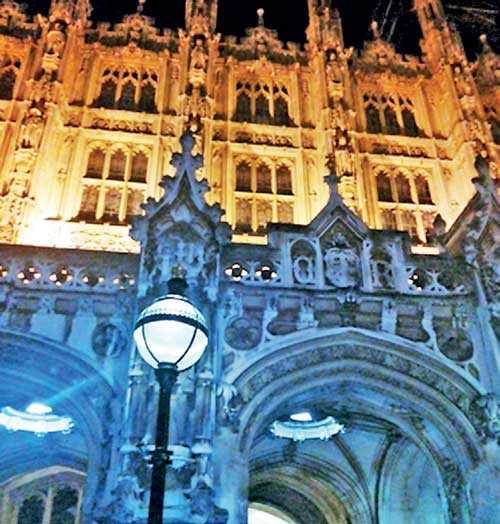Friday Feb 20, 2026
Friday Feb 20, 2026
Tuesday, 24 April 2018 00:00 - - {{hitsCtrl.values.hits}}



Charnika Imbulana
reporting from London
The Cholmondeley Room and Terrace at the House of Lords was the picturesque venue for the evening reception hosted by the Royal Commonwealth Society (RCS) President Lord Howell of Guildford, PC to mark the occasion of the 25th Commonwealth Heads of Government meeting.
The grand event, held on the last evening of the formal CHOGM dates was well-attended with most of the high profile CHOGM delegates, journalists and members of the Commonwealth Society branches that span around the world.
The Royal Commonwealth Society, founded in 1868, is a network of individuals and organisations committed to improving the lives and prospects of Commonwealth citizens across the world.
Through youth empowerment, education and advocacy, the Royal Commonwealth Society promotes the value and the values of the modern Commonwealth. The organisation champions human rights, democracy and sustainable development through our international networks and across the 53 member states which are intrinsically linked through their common history and shared values.
Building on 150 years of RCS history
On 26 June 1868, a group of individuals in London established a ‘literary and scientific body’ dedicated to the greater understanding of what were then British colonies. A year later, it was granted a Royal Charter from Queen Victoria, elevating it to the level of other Royal Societies.
The Society became increasingly progressive in the early decades of the twentieth century. It was given its present name, The Royal Commonwealth Society, in 1958.
London
The RCS received its Royal Charter in 1882. As the Society became increasingly progressive in the early twentieth century, it began admitting women as members, starting from 1922, and encouraging a young and diverse membership. The modern commonwealth was established in 1949 as an association of free and equal sovereign states which has been part of the British Empire, but now independent. It was given its present name, the Royal Commonwealth Society, in 1958.
Through youth empowerment, education and advocacy, the RCS promotes the value and the values of the Commonwealth. It champions human rights, democracy, rule of law and sustainable development for over two billion Commonwealth citizens (a quarter of the world’s population) across the 53 member states, and over 70 self-governing RCS branches and affiliated societies which are intrinsically linked through their common history and shared values throughout the Commonwealth.
The Commonwealth is non-partisan, independent of governments and is supported by public generosity. The Society engages with youth, civil society business and government networks to address issues that matter to the citizens of the Commonwealth countries.
Its primary focus is the promotion of young people throughout the commonwealth to become effective leaders. Over half of the commonwealth citizens are young people aged 25 and over. Some of the campaigns of the society in partnership with other organizations are promotion of human rights, environmental issues, sustainable development programmes, and securing equal rights for marginalized groups among others.
The Royal Commonwealth Society acts as the Secretariat for the All-Party Parliamentary Group (APPG) and the Council of Commonwealth Societies (CCS).
Now in its 150th year, the work of the organisation in improving the lives and prospects of Commonwealth citizens continues around the world under the current Presidency of Lord David Arthur Russell Howell, Baron Howell of Guildford, PC, a British Conservative politician, journalist and economic consultant. Having been successively Secretary of State for Energy, and then for Transport under Margaret Thatcher, Howell was a Minister of State in the Foreign Office from the election in 2010 until the reshuffle of 2012. He has served as Chair of the House of Lords International Relations Committee since May 2016.
Worldwide network
Royal Commonwealth Societies is spread across the world; in Africa, the Americas, the Pacific, Europe and Asia.
The RCS in Asia are: Bangladesh, Brunei Darussalam, India, Malaysia, Pakistan, Singapore and Sri Lanka.
Sri Lanka
The Royal Commonwealth Society, Sri Lanka (RCSSL) was incorporated in 1948, with the Head of State as its patron. In keeping with the theme of RCS, RCS Sri Lanka has been involved in fostering and sponsoring greater interaction between people.
It is noteworthy that in 2009, the RCSSL was recognised by the Commonwealth Society in London as the most active branch in fostering relationships among members, young people and service to the community.
RCSSL also can take pride in the fact that it was the RCSSL’s current President Shiva Yogendrenathen, a long-serving RCSSL member, who made the recommendation to have regional offices on the lines of SAARC and ASEAN at the international meeting of the commonwealth societies held in Malaysia in May 2011.
His recommendation was accepted to have regional offices on the lines of SAARC and ASEAN from the year 2013. Thus, the RSC has five regional offices in Asia, Africa, the Americas, Europe and the Pacific.